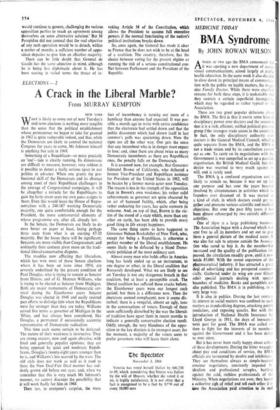A Crack in the Liberal Marble?
ELECTIONS —2
From MURRAY KEMPTON
NEW YORK
WHAT is likely to come out of next Tuesday's mid-term elections is nothing more tangible than the sense that the political establishment whose permanence we began to take for granted in 1962 is quite vulnerable indeed, and that, while the Democrats are likely to control the -national Congress for years to come, Mr Johnson himself is anything but safe in 1968.
Something of a Republican—or more precisely an 'out"--tide is clearly running. Its dimensions are difficult to measure, however; very seldom is it possible to detect a really serious upset in our politics in advance. When one grants the pro- fessional skill of the Democrats and its absence among most of their Republican challengers in the average of Congressional campaigns, it will be altogether a miracle for the Republicans to gain the forty-seven seats my own guess assigns to them. Even this would leave the House of Repre- sentatives with a. 248-187 working Democratic majority, one quite comfortable enough for the President, the more controversial elements of whose programme are, after all, already law.
In the Senate, the Democrats are likely to do even better on paper at least, losing perhaps three seats from what is an existing 67-33 majority. But the losses there will be significant; Senators are more visible than Congressmen; and ordinarily their contests pivot more on the tradi- tional liberal-conservative disputes.
The troubles now afflicting that liberalism, which has won most of those Senate elections where it has been an issue since 1954, are severely underlined by the present condition of Paul Douglas, who is trying to remain as Senator from Illinois, and of G. Mennen Williams, who is trying to be elected as Senator from Michigan. Both are major monuments of Democratic sur- vival during the Eisenhower years. Senator Douglas was elected in 1948 and easily resisted past efforts to dislodge him when the Republicans were far stronger than they are today. Williams served five terms as governor of Michigan in the 'fifties, and has always been considered, like Douglas, a permanent if occasionally eccentric representative of Democratic radicalism.
This time each seems certain to be defeated. The nature of their weakness is instructive. They are strong orators, now and again abrasive, with fixed and generally populist opinions; they are being opposed by quiet and moderate Repub- licans, Douglas's twenty-eight years younger than he is, and Williams's less scarred by the wars. The old style does not work as well as it used to then; the New Deal-Fair Deal manner has sud- denly grown old before our eyes; and, when we remember that this is very much Mr Johnson's manner, we cannot discount the possibility that it will work badly for him in 1968.
Then too, to everyone's surprise, the mere fact of incumbency is turning out more of a handicap than anyone had expected. It was pos- sible a month ago to write with entire confidence that the electorate had settled down and that the public discontent which had shown itself in last summer's polls was quietening down. Now the signs are all the other way. One gets the sense that any incumbent who is in danger must expect to lose; and, since there are about twice as many' Democratic incumbents as there are Republican ones, the penalty falls on the Democrats.
It is assumed now, for example, that Governor Edmund Brown of California, who defeated a former Vice-President and Republican nominee for President of the United States in 1962, will be beaten by a former movie actor next Tuesday.
The reason is less in the strength of the opposition than in Brown's own weakness; his rather solid achievements as governor are quite obscured by an air of harassed futility, which, after being rather endearing for years, has quite outworn its welcome. And, on top of that, Brown is the vic- tim of the mood of a state which, more than any other on earth, has been able to provide every good thing in life except happiness.
The same thing seems to have happened to Governor Nelson Rockefeller of New York, who, except for being a Republican, is otherwise a perfect member of the liberal establishment He seems likely to be defeated by a bland Demo- cratic politician of the most ordinary sort.
Almost every man who holds office in America long has lately ended up as an instrument, to one degree or other, in the liberal coalition that Roosevelt developed. What we are likely to see on Tuesday is not any dangerous breach in that coalition, but at least a perceptible crack. The liberal coalition has suffered those cracks before; the Eisenhower years were our longest such period; but there is a difference now. Then the electorate seemed complacent; now it seems dis- turbed; there is a vengeful, almost an ugly, tone in the conversations of voters. Enough of them seem sufficiently disturbed by the way the liberals of tradition have upset them in recent months to indicate a generally conservative election result. Oddly enough, the very blandness of the oppo- sition in the key districts is its strongest asset; for the moment, a majority of the voters seem to prefer governors who will leave them alone.


































 Previous page
Previous page